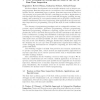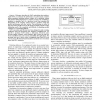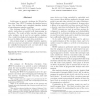874 search results - page 10 / 175 » Predicting the Running Times of Parallel Programs by Simulat... |
ECOOPW
2003
Springer
15 years 6 months ago
2003
Springer
levels of abstraction. Lacking well-established technologies and models for representing and accessing program dynamics, tools must use ad-hoc mechanisms. This limits reuse and int...
108
click to vote
ICCAD
2007
IEEE
15 years 7 months ago
2007
IEEE
— This paper describes the FAST methodology that enables a single FPGA to accelerate the performance of cycle-accurate computer system simulators modeling modern, realistic SoCs,...
RTCSA
1999
IEEE
15 years 5 months ago
1999
IEEE
In this paper we present a technique for Worst-Case Execution Time WCET analysis for pipelined processors. Our technique uses a standard simulator instead of special-purpose pipel...
117
click to vote
SAC
2010
ACM
15 years 3 months ago
2010
ACM
The control flow of common processors does not match the specific needs of reactive systems. Key issues for these systems are preemption and concurrency, combined with timing pred...
120
click to vote
IPPS
2000
IEEE
15 years 5 months ago
2000
IEEE
Cellular automata can be used to design high-performance natural solvers on parallel computers. This paper describes the development of applications using CARPET, a high-level prog...



